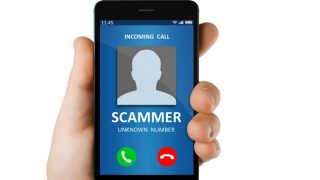Government and Grant-Related Phone Scams: What To Know
Scammers use anything they can in order to trick their targets. The con artists say that they are from government agencies such as the Social Security Administration, the IRS, and the Federal Trade Commission. Scammers have been targeting people to trick them into applying or receiving fake grants from various government agencies. The caller requests personal information to process the grant. They may ask for your date of birth, phone number, address, social security number, annual income, bank account, or other financial information. Scammers claim that the bank account information is necessary to pay a one-time processing fee. They may also state that the free money will be direct deposited or sent through a wire transfer. The aim of a grant scam is identity theft along with draining your bank account.
Grant Scams
Callers may claim they work for a government program that gives grants to people in need. Parameters are usually vague. Some offer free money to pay bills, for educational purposes, or home improvements. Anyone who calls you out of the blue and claims to work for the government is probably a scammer. The FTC has written a guide on identifying the calls and what to do to avoid being a victim.
Following the Script
Telemarketers and scammers always have a script to follow when making phone calls. Here are some common lines con artists might use to lure you into their scams:
- You’ve been selected to receive a grant/scholarship.
- The grant/scholarship will cost a one-time processing fee.
- This grant/scholarship has a 100% money back guarantee.
- This offer is only good for today.
- I just need your credit card/bank account number to hold the grant/scholarship.
- Grants are being offered in your area.
- Small business owners are eligible for government grants.
The Government Grant Process
These are facts about how the government grant process works:
- Names of agencies and foundations offering grants are free to the public through the internet or local library.
- The only way to access federal grants is through www.grants.gov.
- Government grant applications are free.
- ALL government grant money is used for public projects, not personal use.
- The government never asks for fees of any kind.
Investigate the Grant
If you receive information online about a government grant, visit the Index of Government Agencies. All legitimate agencies are listed. Beware of callers using a similar agency name. Scammers may also invent a fake agency name such as the Federal Grants Administration. It sounds official, but the agency doesn’t exist. Legitimate agencies include:
- www.Grants.gov – an overall site.
- www.StudentAid.ed.gov – grants for anything related to financial aid for students of any age.
- www.GovLoans.gov – Information for federal loans for housing, disaster relief, and veterans’ benefits.
- www.Benefits.gov – Other benefits not listed above.
Red Flags
Warning signs for fraud include:
- The caller requests immediate payment with a credit card or debit card.
- A request is made to pay using a pre-paid gift card or an iTunes card.
- The caller uses threatening language.
- The phone number is not a toll free number, e.g., 800, 888, etc.
- The scammer is calling from another country.
- The phone number registers as a spam call or Internet (VoIP) number; the latter can’t be traced.
Forms of Contact
Phone calls are the most common form of contact for government grant scams. However, scams can take place through text message, email, or social media sites.
Text Message
A common text message is short and contains a link. It may look like this: “Congratulations! You are eligible to receive a free grant from the federal government. Click here: www.fakemessage.org”
Emails are more elaborate and detailed. The message claims you have been chosen for a free government grant because you signed up for a website. The email explains the grant and the fact that it’s free money. There is a website link or place to enter personal information. The signature shows the following fake information: name, agency, and a non-existent address in Washington, D.C.
Social Media Sites
Con artists use social media sites to get money from potential victims. Targets receive a private message about a free grant. The message may come through as an ad or from someone on your friends list. If you receive a message from a friend, contact the friend in a separate message asking if it’s legit. If the friend didn’t send the message, all parties should change passwords immediately.
Report Suspicious Activity
If you receive a suspicious call, hang up. Do not press 1 to be removed or give out your personal information. The caller may make threats, but do not respond. You can block calls on your iPhone or Android if the number is in the form of a standard number. Scammers use different numbers to confuse targets, so be aware of strange numbers.
Notify law enforcement via their non-emergency line if the caller makes any type of threats. You should also report the call to ftc.gov/complaint, Better Business Bureau, and support@grants.gov. Include the following:
- Date and time of the call.
- Content of any text messages, social media site or email.
- The name of the company used by the caller.
- The amount of the free government grant.
- The dollar amount requested along with the payment method.
- Give the caller’s phone number. Scammers use untraceable Internet phone numbers or spoof a phone number registered to the government agency. Although the numbers aren’t real, law enforcement might be able to trace them with a tracking system.
- Note any other details from the call. Be as specific as possible.
Conclusion
Remember, if you receive a call from a scammer, simply hang up. Do not answer any questions or give out personal information. Don’t confirm information the caller claims to have. The best way to avoid scams is to let unknown numbers go to voicemail. Don’t call back and block the phone number of any suspected scam phone call.

